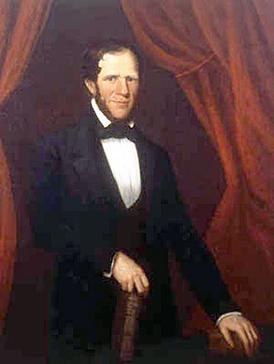Thomas Roderick Dew facts for kids
Quick facts for kids
Thomas Roderick Dew
|
|
|---|---|
 |
|
| 13th President of the College of William & Mary |
|
| In office 1836–1846 |
|
| Preceded by | Adam Empie |
| Succeeded by | Robert Saunders, Jr. |
| Personal details | |
| Born | 1802 King and Queen County, Virginia |
| Died | 1846 |
| Education | The College of William & Mary |
| Occupation | Professor of History, Metaphysics, and Political Economy, College of William & Mary |
| Known for | Proslavery writings |
Thomas Roderick Dew (1802–1846) was a professor and later the president of The College of William & Mary. He was well-known for strongly supporting slavery.
Contents
About Thomas Dew
Thomas Dew was born in King and Queen County, Virginia, in 1802. His father, Captain Thomas Dew, was a soldier in the Revolutionary War. He also founded Dewsville, a successful plantation.
Thomas Dew attended The College of William & Mary and finished his studies in 1820. After that, he spent several years studying in Europe. From 1827 to 1836, he taught history, metaphysics (the study of basic truths about existence), and political economy (the study of how politics and economics connect) at William & Mary. He then became the college's president until he died in 1846 from bronchitis.
Dew was asked twice to run for political office but said no. He also turned down teaching jobs at the University of South Carolina and the University of Virginia. Shortly before he died, he married Natalia Hay. He passed away during their honeymoon in Paris. His body was later moved to the crypt under the Wren Chapel at William & Mary.
Dew's Early Influence
Dew became famous in 1828 when he spoke out against a new tax law called the "Tariff of Abominations." This law placed high taxes on imported goods. He believed in free trade, meaning goods should move between countries without high taxes. He argued that these taxes helped factories in the North but hurt farmers in the South.
He also supported state banks instead of a national bank. He thought a national bank would give the government too much power over the economy.
Views on Slavery
Thomas Dew was a very strong supporter of slavery. He wrote many papers and gave speeches defending it.
Defending Slavery in Virginia
In 1832, Dew published an important paper. It was called A Review of the Debates in the Legislature of 1831 and 1832. This paper helped stop a movement to end slavery in Virginia. The debate in the Virginia government happened after Nat Turner's slave rebellion in 1831.
Dew argued that white people and freed Black people could not live together peacefully. He also said that sending freed American Black people to Africa, a plan supported by the American Colonization Society, was too expensive. He also thought it was too difficult to organize. He even noted that removing Black people would stop Virginia from making money by selling enslaved people to other Southern states.
However, not everyone agreed with Dew. Jesse Burton Harrison wrote a strong response. He argued that sending freed slaves to Africa was possible. He also said that slavery was not good for the economy.
Dew's Impact and Legacy
When Dew became president of William & Mary, he told young farmers to fight against people who wanted to end slavery. He believed a broad education was important, but he stressed that morals and politics were the most important subjects.
Dew was highly respected in the Southern states. His writings were shared widely and helped strengthen public opinion that supported slavery. His work has been compared to that of Samuel A. Cartwright. Cartwright was a doctor who defended slavery. He even claimed to find "diseases" that made enslaved people want to run away.
Many people at the time believed Dew was responsible for stopping the effort to end slavery in Virginia in the 1830s. He was against even slowly ending slavery. Dew's teaching and writings influenced later generations. These generations opposed Reconstruction after the Civil War. They also created Jim Crow laws, which enforced racial segregation and discrimination.
Dew's Views on Men and Women
Thomas Dew also had strong opinions about the differences between men and women.
He described women as modest, quiet, good, and religious. He believed these traits came from women's physical weakness. This weakness, he thought, made them depend on men. He also said that men were smarter than women in all cultures and times. However, he blamed this difference on education, not on natural ability. Dew argued that women should not be allowed to vote. He believed their focus on their own families stopped them from understanding bigger political issues.
He also talked about the difficulties men faced in the world of business. He said men needed great strength to succeed in such a competitive place. For Dew, courage and boldness were qualities of men. He saw women as dependent and weak, but also as a source of great power.
Writings by Thomas R. Dew
- A Review of the Debates in the Legislature of 1831 and 1832 (1833)
Archived Materials
You can find Thomas Dew's family papers and documents from his time as president of The College of William & Mary at the Special Collections Research Center there.
In Popular Culture
A made-up book by Dew, called Inequality Is the Basis of Society, appears in the movie Sabata (1969). In the film, a bad guy reads from it. A quote from the book is: "The responsibility of command is to use lesser men."

